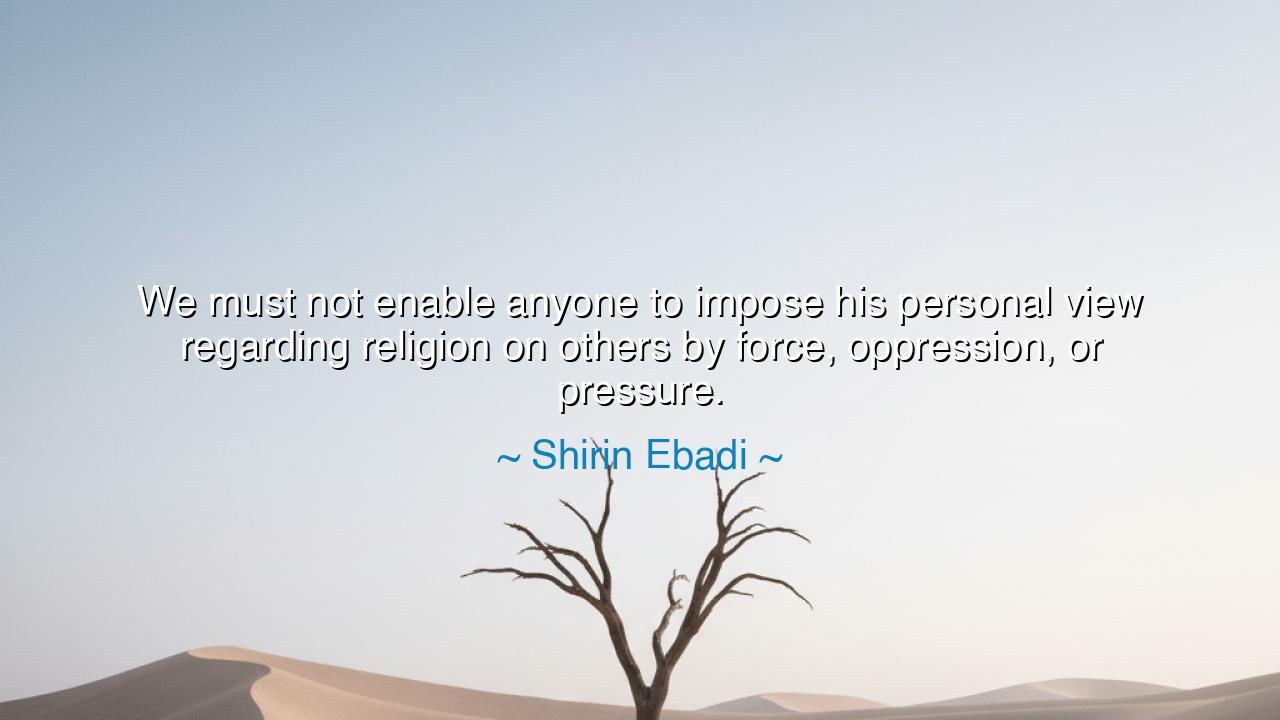
We must not enable anyone to impose his personal view regarding
We must not enable anyone to impose his personal view regarding religion on others by force, oppression, or pressure.






"We must not enable anyone to impose his personal view regarding religion on others by force, oppression, or pressure." These powerful words by Shirin Ebadi remind us of the sacred right of every human being to walk their own path in matters of faith and belief, unburdened by the weight of another's will. It is a call for the protection of freedom—the freedom to choose, to think, and to believe without fear of being coerced or silenced by others. In this simple yet profound statement, Ebadi speaks of an essential truth: true spirituality can never be forced, for faith that is not freely chosen is no faith at all.
To understand the depth of this wisdom, we must first look to the world around us, where the imposition of one person’s beliefs upon another has caused countless tragedies throughout history. From the Inquisition to the oppressive regimes of modern-day dictatorships, history has shown us the destructive power of those who seek to wield religion as a weapon, to dictate to others how they must worship, how they must think, and what they must believe. The violence and suffering that accompany such impositions stand as a stark reminder that when we seek to force belief, we destroy not only the freedom of others but also the very spirit of the faith we claim to protect.
Consider, for instance, the religious persecutions of the past, such as the horrors inflicted upon the Huguenots in France, or the forced conversions carried out during the Spanish Conquest of the Americas. In both instances, the leaders believed that imposing their religious views on others was not only justified, but divinely mandated. Yet in their pursuit of what they perceived as righteousness, they trampled on the sacred freedom of the human soul, causing suffering, division, and loss of life. These events serve as a testament to the dangerous folly of seeking to control the beliefs of others through force and fear.
In more recent times, we can look to the struggles faced by women in countries where oppressive regimes seek to impose their interpretation of religion through violence and intimidation. Shirin Ebadi, herself a champion of human rights, has witnessed firsthand the consequences of such oppression. In her native Iran, women have been subjected to harsh laws, forced to conform to a rigid and narrow interpretation of faith that stifles their personal freedoms and silences their voices. The oppression of women in the name of religion is a tragic example of how easily religious ideals can be twisted into tools of control when they are used to suppress the individual.
Ebadi's words are not just a critique of oppressive regimes, but a clarion call for freedom of conscience. To impose one's personal view of religion on another through force, oppression, or pressure is an affront to the very essence of what it means to be human. Faith, in its purest form, cannot be coerced. It must be freely chosen, nurtured through understanding, compassion, and respect for the dignity of others. As such, the lesson is clear: we must stand against the forces that seek to control the minds and hearts of others, and we must defend the right of every person to choose their own path to the divine.
In our own lives, we must reflect on the wisdom of Ebadi’s words and ask ourselves: How do we treat the beliefs of others? Do we seek to impose our own views, or do we cultivate an environment where people are free to explore, question, and follow their own spiritual journeys? The answer lies in the way we respect others—whether we treat their beliefs with dignity and understanding, or whether we seek to pressure them into conformity. In every interaction, we can choose to uplift rather than oppress, to engage in dialogue rather than force our will upon another.
The message is clear: the freedom of belief is not a luxury, but a fundamental right. We must stand in solidarity with those who are oppressed for their beliefs, and we must teach future generations the importance of tolerance, compassion, and respect for the spiritual paths of others. As we carry this wisdom forward, we create a world where faith is not a tool of domination but a source of unity, where diversity in belief is celebrated, and where every person is free to walk their own journey to the divine. In this way, we fulfill the true promise of spirituality—a promise of freedom, peace, and respect for the sacredness of each human soul.






AAdministratorAdministrator
Welcome, honored guests. Please leave a comment, we will respond soon